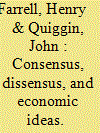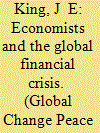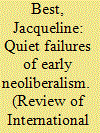| Srl | Item |
| 1 |
ID:
155488


|
|
|
|
|
| Summary/Abstract |
During the recent economic crisis, Keynesian ideas about fiscal stimulus briefly seemed to form the basis of a new expert consensus about how to deal with demand shocks. However, this apparent consensus soon collapsed into a continuing dissensus, with important consequences for policy. Neither conventional bargaining accounts nor existing theories of the role of ideas in policy outcomes easily explain the arc of international responses to the Great Recession. In this article, we propose that sociological arguments about professions, in conjunction with those about spaces of political contention as ecologies, provide a better understanding of the puzzle of Keynesianism’s rise and decline. The internal dynamics of prestige and status within the profession of economics intersected with policy arguments between states so as to make macroeconomic policy a “hinge” issue, over which coalitions in both ecologies contended. This explains how Keynesian economists and political actors worked together in the first phase of the crisis to advocate for and implement fiscal stimulus. It also explains why aggrieved policy actors, who did not favor stimulus, could help disrupt the apparent consensus in the second phase of the crisis by promoting the views of dissident economists.
|
|
|
|
|
|
|
|
|
|
|
|
|
|
|
|
| 2 |
ID:
090872


|
|
|
|
|
| Publication |
2009.
|
| Summary/Abstract |
The recession has apparently led to a surge of school-leavers applying to study economic at university (in the United Kingdom). Application were up by 15% in January, and similar increases have been recorded for school economics lessons for 16-and 18-year-olds...One of the areas Prospective economics students might care to study is why most economics failed to foresee the recession, and why those who did made not a blind bit of difference.
|
|
|
|
|
|
|
|
|
|
|
|
|
|
|
|
| 3 |
ID:
176494


|
|
|
|
|
| Summary/Abstract |
While the last few decades of political economic history give the impression that the logic of neoliberalism is inexorable, this article argues that once we look further backwards and dig into recently declassified archives documenting the early days of neoliberal theory and practice, we find a messier picture. Economic policymakers in Thatcher and Reagan's administrations in the early 1980s did not set out to ‘fail forwards’ by generating a crisis that would enable a statist kind of neoliberalism. The key ideas that they drew on and the policies that they used to put them into practice sought to transform the economy indirectly, through a set of performative policy devices that they believed would generate a dramatic shift in people's inflationary expectations, lowering inflation without provoking a major recession. Archival records make it clear that these efforts were not only a failure, but also one that policymakers were acutely aware of at the time. By examining these quiet failures in economic policy, we can better understand how these governments simultaneously failed in their early efforts to introduce neoliberal economics and yet ultimately succeeded in transforming their economies in important respects – and in legitimising those transformations by narrating failure as a kind of inevitable success.
|
|
|
|
|
|
|
|
|
|
|
|
|
|
|
|